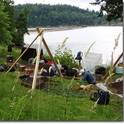- Klallam,
- Geoarchaeolgical analysis,
- Port Angeles
Geoarchaeological analysis at Čḯxwicən, an ancestral Klallam village near Port Angeles in northwestern Washington State, U.S.A., highlights the resilience of coastal foragers and their connection to place. Ancestral Klallam peoples occupied ever-changing beach and spit landforms growing within the shelter of Ediz Hook on the Strait of Juan de Fuca (SJDF) for 2700 years. Geoarchaeological methods were employed to define seven chronostratigraphic zones that chronologically structure the cultural deposits and allow them to be correlated to a sequence of beach development and to markers for tsunami that overtopped the site. Initial habitation prior to 1750 BP utilized a narrow beach against the bluff, then expanded with the prograding beach ridges, which grew north to create a lagoon. Stabilization of beach ridges after 1300 and 1000 BP was followed in each case by construction of a plank house, one of which was occupied for 800 years, and the other for 500 years. Inundation of the site, as indicated by erosional channels, backwash deposits, and structural collapse, occurred five times, and can be correlated with documented Cascadia Subduction Zone plate boundary megathrust earthquake events. The resilience of the households, who re-occupied the houses soon after the events, is striking, particularly the rebuilding of one house after it collapsed around 600BP.
Available at: http://works.bepress.com/sarah-campbell/59/
